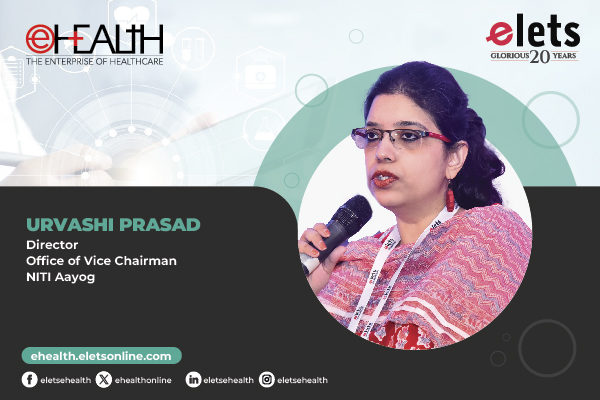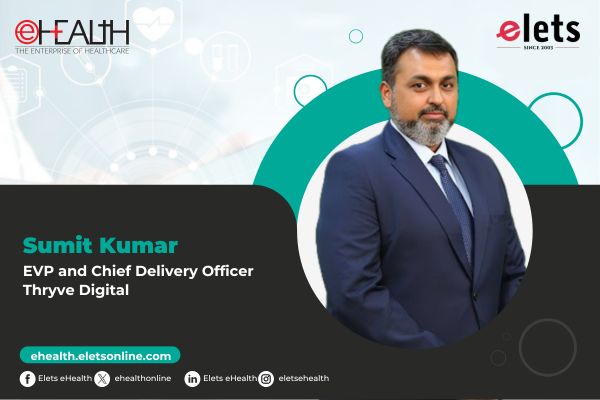
In an era where the intersection of technology and healthcare is increasingly vital, Dr. Urvashi Prasad, Director, Office of VC, NITI Aayog, in this exclusive interview with Dr. Asawari Savant of Elets News Network (ENN), discusses the pivotal role of health technologies in addressing the unique mental health challenges faced by cancer patients, with a particular focus on accessibility and affordability. The discussion delves deep into the critical need for addressing connectivity issues, the gender digital divide, ethical concerns, and the importance of multi-stakeholder collaboration to effectively leverage health technology solutions across India. Edited excerpts:
Dr. Prasad, what role do you see innovative health technologies playing in addressing the unique mental health challenges faced by patients with cancers, particularly in terms of accessibility and affordability?

When it comes to health technologies, including telemedicine, there is significant potential for providing access to people who might not otherwise receive quality care. During COVID-19, when we were unable to access doctors or specialists in person due to social distancing norms, we found that telemedicine could be a very helpful intervention. It allowed people to obtain specialist opinions from doctors who could be located in cities or anywhere across the country. This technology enabled people in relatively remote and rural areas to access medical information and advice.

During the pandemic, telemedicine significantly boosted the adoption of health technology, facilitating consultations and medical advice. It is important to note, however, that health technology is not a solution for all issues and problems. It is an enabler—an important one if used correctly—but it is not a cure-all. Therefore, it must be combined with other broader interventions in the health sector. This understanding is crucial; health technology should be seen as a complement, not a substitute, to traditional healthcare practices. It can serve as an important additional intervention in our overall healthcare strategy.

Could you elaborate on the key challenges and opportunities in leveraging health technology platforms to address the gaps in healthcare delivery across urban and rural areas in India?

When it comes to challenges and the advances we have made, there are several important points to consider. Regarding challenges, particularly in the realm of digital health and telehealth, issues such as connectivity and internet coverage are crucial. These necessities remain a challenge in certain geographies. In India, there is also a gender digital divide that we need to address while discussing access to any type of technology, including health technologies.
In addition to these challenges, we face issues related to creating awareness among all stakeholders and building their capacity. This involves understanding how to use these technologies and integrating them into current practices. From the provider’s perspective, it is essential that they become comfortable with these technologies. COVID-19 accelerated this process, but continued effort is required. Similarly, on the patient side, it is important that they feel comfortable using these technologies to consult with doctors, practitioners, and counselors, and that they utilize these technologies broadly. This awareness and capacity building is a significant requirement and also a challenge, given the scale at which it needs to be implemented in a country like India.
Also Read:- Prioritising Public Health: Key Policy Focus for India’s Healthcare System
Furthermore, we must address ethical issues, data privacy concerns, and consent matters. As we talk about technology and patient data—which may be stored or shared electronically—we must ensure that these issues are properly managed and addressed.
Considering the diverse needs of patients, how do you propose tailoring health technology solutions to ensure inclusivity and effectiveness in addressing their mental health concerns?
When it comes to mental health, the challenges are particularly significant due to the sensitivity of the issue. The services we provide digitally in this area must be delivered with utmost care. The individuals offering consultations and support through tele-mental health helplines must be properly qualified and trained. They need to know how to handle situations involving individuals who might be in distress or whose lives may be at risk.
It is essential to understand how to identify the issues faced by individuals. For example, many apps now allow users to fill out forms detailing their symptoms, which are then used to assess their mental health challenges. We must ensure that these forms and assessments are designed and reviewed by trained and qualified professionals. Accreditation and quality checks are vital in this context.
In the digital health space, maintaining high standards is especially important. Health issues are inherently sensitive, and mental health issues are even more so. This makes it crucial to be conscious of the qualifications and training of those involved in delivering digital mental health services.
How do you perceive the role of collaboration between government agencies, private sector stakeholders, and academic institutions in fostering innovation and driving the adoption of health technology solutions for health in India?
During COVID-19, the acceleration of digital health and telemedicine was significant, but it is essential to maintain this momentum and not revert to previous practices. Ensuring this continuity requires the collective effort of all stakeholders, including the government, private sector, civil society, and citizens. We must leverage the lessons learned during the COVID period to continue advancing digital health and telemedicine.
This effort needs to be multi-sectoral and multi-stakeholder. The government, private sector, civil society, and patients themselves must collaborate in both the design and adoption of health technology solutions. Addressing diverse patient needs effectively requires good representation and understanding of patient concerns during the design of health technology or telemedicine platforms. Patients must be at the heart of any design effort.
The private sector plays a crucial role in providing technology and enabling scale, making public-private partnerships essential. The government has a significant role in setting standards, and ensuring that platforms are operated by qualified individuals, especially given the sensitivity of health and mental health issues. Providing incorrect advice in this field can endanger lives, making it critical to handle this with care.
The government is also responsible for establishing and strengthening the backbone of the digital health system, addressing privacy, consent, ethical issues, and data storage and sharing, particularly concerning personal health data. Civil society, including NGOs working in local communities, plays a vital role in capacity building and addressing gender and geographical disparities. They can provide valuable insights into what people need, what matters to them, and what is convenient or inconvenient for them.
In summary, it is crucial to foster collaboration among all stakeholders to ensure the continued progress and effective implementation of digital health technologies.
The COVID-19 pandemic accelerated the adoption of telehealth globally. How has this unprecedented health crisis influenced the prioritization and expansion of telehealth initiatives in India, particularly in the realm of mental health, and what lessons have been learned from this experience?
Going forward, the scope of health technology is tremendous, but it is not a panacea or a silver bullet solution for all problems related to access, affordability, and quality in the healthcare sector. It is, however, a very important enabler. Given that we are such a large country, the convenience of using health technology solutions is significant. If we achieve good internet coverage and digital reach across all parts of the country, these services could potentially be accessed from anywhere. Individuals could conduct remote consultations or access other digital health services from any location.
The potential for health technology is enormous, particularly for individuals living with chronic conditions, including many mental health issues such as depression or anxiety, which people often experience for extended periods. Advantageously, they do not always have to visit a doctor in person; instead, they can use digital tools, mobile apps, and telehealth services. This is especially convenient for managing chronic conditions.
Moreover, for conditions like mental health where social stigma remains, digital health solutions offer privacy. Many people, especially women, may hesitate to visit a doctor or health provider in person but might be more willing to consult from the privacy of their homes. This privacy can encourage timely consultations and support. Similarly, people with mental health issues might prefer the anonymity of digital consultations over in-person visits to a psychiatrist, psychologist, therapist, or counselor.
Health technology can provide these benefits, making the potential for the future immense. However, we need to address existing divides—geographical and gender-based—and ensure good digital and internet coverage across the country. It is crucial to promote digital literacy so that everyone in the healthcare ecosystem is comfortable using these technologies and integrating them into their daily lives, work, practices, and behaviors.
Finally, we must continue to address issues of ethics, privacy, and consent regarding data storage and sharing. These will remain important as we move forward, especially given the diversity of our country and the different ways states implement these programs. Addressing these concerns will be an ongoing process.
Looking ahead, what do you envision as the future trajectory of telehealth for mental health in India, and what policy reforms or strategic interventions are needed to realize this vision?
Finally, I believe there is significant potential, indeed tremendous potential, to integrate telehealth solutions with the health and wellness centers established under Ayushman Bharat across the country. These centers focus on comprehensive primary healthcare, where mental health plays a crucial role. Integrating health technology solutions with these centers, along with the government’s Tele-Manas helpline for mental health, presents a promising avenue for further development. This integration is already underway, but there is even greater potential for expansion and enhancement in the future. It’s essential to continue building on these efforts, not only at the central level but also, crucially, at the state level.
Be a part of Elets Collaborative Initiatives. Join Us for Upcoming Events and explore business opportunities. Like us on Facebook , connect with us on LinkedIn and follow us on Twitter , Instagram.
"Exciting news! Elets technomedia is now on WhatsApp Channels Subscribe today by clicking the link and stay updated with the latest insights!" Click here!
















